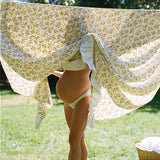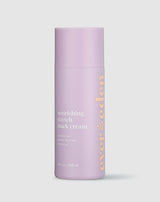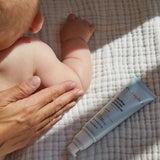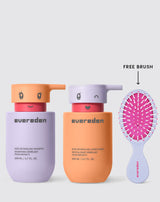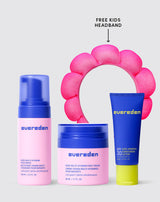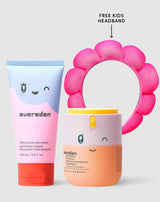Detoxing implies that you’re cleansing your body of toxins. But at Evereden, we believe in living a life in which toxins aren’t involved in the first place—aka #NoTox. Wellness, to us, is a holistic practice, not a quick cleanse. It’s a marathon, not a sprint, which is why it’s important to focus on what you put into and onto your body on a regular basis.
Now can be a great time to step back and explore how to make your life more holistically #NoTox—that is, exploring alternative and ancient healing practices to help enhance your mental and physical wellbeing—especially if you are pregnant, a new mom, or just raising a family while balancing the stresses of the world.
Recently, we were so lucky to speak with Dr. Shari Auth, DACM, LAC, LMT, a doctor of Chinese medicine, acupuncturist, and board-certified herbalist who also happens to be the co-founder of WTHN, a New York City-based wellness studio that aims to make acupuncture as accessible as a blowout (noted by both Vogue and the New York Times). She broke down the myths surrounding acupuncture, guided us through a pregnancy-to-motherhood acupuncture treatment plan, and suggested #NoTox practices that we can practice at home.
Acupuncture Myths and Truths
Myth: Pregnant women should avoid acupuncture due to “forbidden points,” which are acupuncture points that could induce preterm birth.
Truth: Different acupuncture points have different therapeutic effects on the body, and Dr. Auth prefers to refer to them as contraindication points—as in, acupressure points that don’t give you the result you want. “In a typical session, we set goals that helps us create point protocols that are always customized to meet the patient’s needs,” Dr. Auth explains. “You wouldn’t use points that would induce labor on someone who is four months pregnant, for obvious reasons, but you would use points that help ensure fetal health and maintain the pregnancy.” Also, all acupuncturists are trained for three-to-five years to work with hundreds of conditions—including pregnancy. You’re in good hands.
Myth: Acupuncture isn’t an enjoyable experience because the needles will hurt.
Truth: Acupuncture needles are nothing like sewing needles. They’re the size of human hair, Dr. Auth tells us. “You can fit 40 acupuncture needles into one hypodermic needle, and it’s really common to fall asleep during treatment,” she adds. “Many patients leave the table feeling relaxed and rejuvenated—similar to what you get from a massage.”
Myth: Acupuncture won’t work on me because I don’t believe in “woo-woo” medicine.
Truth: Acupuncture is real, ancient medicine based on hundreds of years of practiced, backed by clinical studies. In China, acupuncturists are revered as much as doctors of Western medicine, and they practice in the same hospitals together. “This isn’t like whether you believe in Santa Claus or not,” Dr. Auth says. “Acupuncture balances hormones, which is why it is so good for women throughout their lives. And acupuncturists are in school for as long as medical doctors.”

Pregnancy Acupuncture Treatment Plan
First trimester: The main complaints that acupuncture addresses are morning sickness and fatigue, as well as stress and anxiety. “Getting pregnant is a bit like jumping off a cliff and you don’t know what’s going to happen, and you’re not in control,” she explains. “A lot of it is about surrendering to what is going to happen to you.” Acupuncture can help calm the nervous system. It lowers cortisol levels, which is your primary stress hormone, and increases serotonin and dopamine levels, which make you happy. Acupuncture has also been clinically proven to relief nausea in cancer patients getting chemotherapy treatment, and can help maintain healthy energy levels.
Second trimester: This is the golden trimester—a blanket statement, Dr. Auth notes with caution—when everything feels pretty good. But that doesn’t mean you should quit going to acupuncture. Dr. Auth recommends going to acupuncture once a week for most pregnant patients, or a minimum of once a month. “Acupuncture is a system of wellness,” she explains. “You go to stay healthy, work on your stress levels, optimize digestion and sleep, and optimize energy.”
Third trimester: This is when the pain—in the back, in the neck—starts because the body is changing. “Acupuncture is amazing for pain,” Dr. Auth explains. “It's going to increase your body's natural opiates, your body's natural painkillers—like endorphins—and increases circulation, similar to massage.” By increasing circulation, it will also help with inflammation and swelling, which tends to occur in the lower legs in the third trimester. And then, when it is time for the baby to arrive, acupuncture points can be used to help induce labor. “I’ve had people leave my office and head straight to the hospital,” she says.
Postpartum: Acupuncture can help reset your hormones and get your cycle on track. It can also help with postpartum depression. “It’s good for energy levels,” Dr. Auth explains. “You're usually pretty exhausted, postnatal, and usually not sleeping, so it can help boost your body's natural melatonin, which is going to help reset your circadian rhythm.” It can also help with breastfeeding. “Acupuncture increases prolactin, which is the hormone that stimulates breast milk production,” she explains.

#NoTox at Home Ideas
If you’re not in New York City and can’t make it to WTHN for their treatments (which are following COVID safety protocols), Dr. Auth recommends the following DIY ways that you can introduce ancient healing practices into your #NoTox holistic routine:
- Drinking ginger and mint tea can help with nausea—for any ailment.
- Drinking rosehip tea can help with iron absorption, which is important for pregnant women with growing fetuses.
- Drinking chamomile tea for calming is safe for both mother and baby.
- Drinking a combination of fennel, milk thistle, and fenugreek to help increase breast milk production.
- Giving yourself an acupressure treatment on the acupuncture point, Pericardium 6 (PC 6), which helps with both nausea and anxiety.
- Giving yourself a sound therapy treatment at home with WTHN’s own sound meditations, available for download.
- Using ear seeds, which are tiny beads placed on the ear’s acupuncture points. Can be worn for up to 5 days to help with detox/digestion issues.
Main image courtesy of Kelly Brown (@kellybrownphoto) and body images courtesy of Stacey Kassandra (@staceykassandra)

